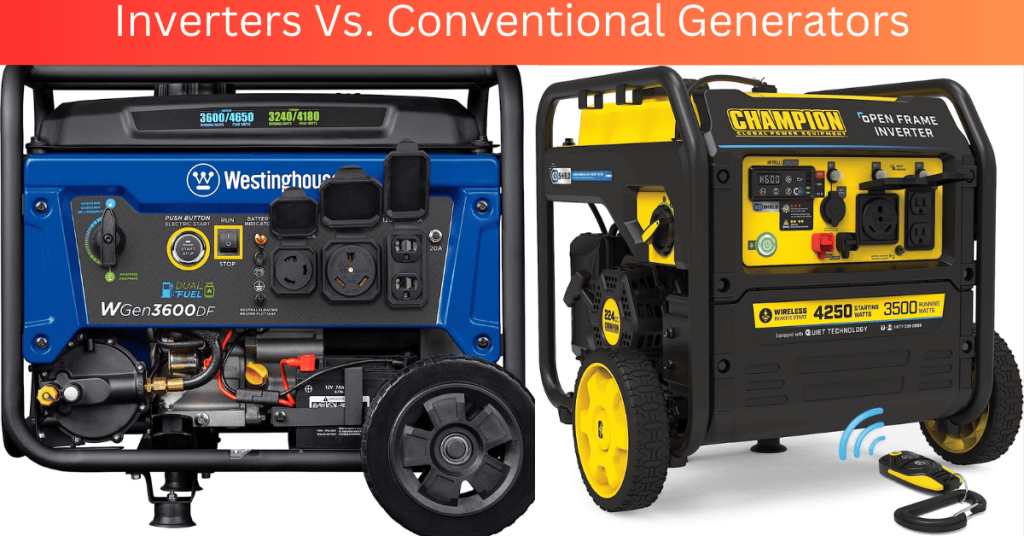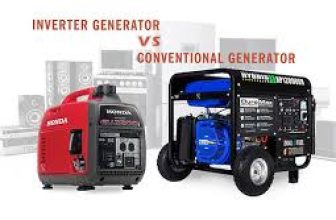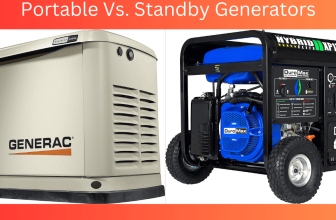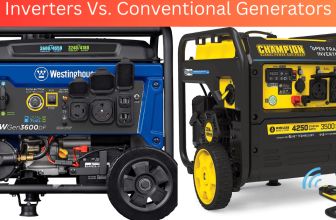When it comes to generators, there can be a lot of confusion about the difference between inverter and conventional models. I know this from personal experience since it took me a while to figure out which type would best suit my needs.
In this article, I will break down the differences between these two types of generators so you can make an informed decision about which is right for you. Inverter and conventional generators have some similarities, but they also have significant differences that can have a significant impact on how well they meet your needs.
We’ll look at the pros and cons of each type, so you can understand what sets them apart and make the right choice for your situation.

How Does An Inverter Generator Work?
I’m sure you’ve heard of inverter generators, but do you know how they work? In this article, I’ll explain the basics of an inverter generator and how it differs from a conventional generator.
Inverter generators use a particular alternator that produces AC power at variable speeds. As the engine speed increases or decreases, the alternator adjusts its output to match the demand.
This means that when there is a low load on the generator, such as when running only a few appliances, the engine will run at lower speeds to save fuel and reduce noise levels.
The inverter technology also provides clean power that is ideal for sensitive electronics like computers and TVs. The electricity generated by an inverter generator has less than 3% total harmonic distortion (THD) compared to up to 25% THD from a conventional generator.
This means your electronic devices are better protected from sudden voltage spikes and other fluctuations that can occur with conventional generators.
With these benefits in mind, it’s no wonder why many people turn to inverter generators for their power needs. But understand that an inverter generator is just one option – next we’ll look at how a conventional generator works differently.
How Does A Conventional Generator Work?
A conventional generator is a device that converts mechanical energy into electrical energy. It works by using an engine to rotate a coil of wire inside of the generator’s magnetic field. This causes the electrons in the wire to move, which generates electricity. This electricity can then be used to run devices or power electronics.
When an engine rotates the coil of wire, it creates a series of pulses that are amplified by the magnetic field inside the generator. This produces an alternating current (AC) signal, which is then sent to any device that needs electricity. The frequency of this signal depends on how fast the engine is running and is usually between 50 and 60 hertz (Hz).
Conventional generators are relatively simple devices and have been used for many years in both residential and industrial applications. They are easy to use, reliable, and require minimal maintenance.
However, they can be noisy and inefficient due to their reliance on engines that run at constant speed. With advances in technology, inverter generators have become more popular as they offer improved efficiency and quieter operation than conventional generators.
Advantages Of Inverter Generators
I’m sure many of you have heard about inverter generators and conventional generators. But what’s the difference, and which one is right for you?
Inverter generators are more expensive, but they offer many advantages over conventional generators.
First of all, inverter generators are much quieter and more fuel-efficient than conventional ones. They use a particular type of alternator that produces a clean sine wave, which means less noise and vibration compared to conventional generators. They also run much more efficiently, so you’ll save money on fuel in the long run.
In addition to being quieter and more efficient, inverter generators also provide better power quality than traditional models. The clean sine wave produced by an inverter generator is ideal for powering sensitive electronic equipment like computers, medical devices, audio systems, and lighting systems. This makes them perfect for camping trips or tailgating parties where you need to power electronics without worrying about power surges or spikes.
Inverter generators have several built-in safety features like overload protection and automatic shutoff when low oil levels are detected. These features help ensure your generator runs safely and reliably every time you use it.
With all these advantages combined, it’s easy to see why so many people choose an inverter generator over a traditional model.
Now that we’ve explored the advantages of using an inverter generator let’s take a look at the benefits of conventional models – starting with their lower price tag!
Advantages Of Conventional Generators
I’m sure you’ve seen both inverter and conventional generators in action. But do you know the differences between the two? In this section, we’ll look at the advantages of conventional generators.
| Advantage | Disadvantage |
|---|---|
| Easier to find repair parts | Noisier than inverters |
| Require less maintenance | More expensive |
| More robust and durable | Lower output power |
Conventional generators are often more accessible because it’s easier to find replacement parts. You don’t have to worry about going out of your way just to get something serviced or fixed when using a conventional generator. They also require less maintenance, which makes them an even better choice for those who want something that won’t need regular attention. Conventional generators are also generally more robust and durable, able to withstand more wear and tear than inverters.
However, there are some downsides to conventional generators. For one, they tend to be noisier than inverters, making them a nuisance if you’re trying to use one in a residential area or near people. Additionally, they tend to be more expensive than inverters due to the amount of power they can generate and how long they last. Finally, their output power is usually lower than what you’d get from an inverter, so you’ll likely have fewer options available when it comes time to pull something up with one of these generators.
Now that we’ve looked at the advantages of conventional generators let’s move on and see what disadvantages come with using an inverter generator instead.
Disadvantages Of Inverter Generators
Inverter generators are a great tool for providing power when you’re away from an outlet, but they come with disadvantages.
For starters, inverter generators are more expensive than conventional generators and require more maintenance. Additionally, inverter generators tend to be less powerful and cannot provide the same power level as a traditional generator.
The cost of an inverter generator is substantially higher than that of a conventional generator. While both types of generators can be rented or purchased, their price difference can be pretty significant. Additionally, the cost to maintain an inverter generator tends to be significantly higher due to its need for more frequent maintenance and its sophisticated electronics.
In terms of power output, an inverter generator is not as powerful as a conventional generator. The maximum power output of an inverter generator is often lower than that of a conventional model, and it may not have enough capacity to run all your appliances at the same time. This means that if you need to run multiple appliances simultaneously, you may need two or more inverters in order to get the job done.
With these considerations in mind, it’s important to weigh the pros and cons before deciding whether an inverter or conventional generator would best suit your needs. Moving forward, let’s take a look at the disadvantages associated with traditional generators.
Disadvantages Of Conventional Generators
It can be incredibly frustrating when you’re faced with a decision between an inverter generator and conventional generator. With so many differenhem, it’s hard to know which one is best for your needs. Unfortunately, conventional generators come with some pretty significant drawbacks that can’t be ignored.
The most notable disadvantage of using a conventional generator is its noise level. These types of generators are typically louder than inverter generators, making them less suitable for home use or camping trips where peace and quiet is desired. On the other hand, if you’re looking for a more industrial-strength option for your business or construction project, then a conventional generator may be the better choice.
Additionally, conventional generators aren’t as fuel efficient as their inverter counterparts. This means that they need regular refuelling and maintenance in order to keep running efficiently and prevent long-term damage to the machine itself. While this may not seem like much of an issue at first glance, it can cause quite a bit of stress over time if you don’t plan your refuelling schedule carefully.
All these factors mean that you should always weigh up the pros and cons of each type before making your final decision about which one is right for you.
And now, we come to the next important question: what are the differences in cost?
What Are The Differences In Cost?
The cost of inverter generators and conventional generators can vary significantly. When it comes to purchasing either one, there are several factors to consider.
While the initial cost of an inverter generator may be higher than that of a conventional generator, the long-term benefits make them well worth the investment. Inverter generators use advanced technology to produce power that is much quieter and more efficient than their conventional counterparts. The technology also allows for greater fuel efficiency, which means you don’t have to refuel as often as you would with a conventional generator.
This also translates into fewer trips to fill your tank and more money saved in the long run. On top of that, inverter generators tend to last much longer than conventional models because they are designed with better durability in mind. With fewer repairs needed over time, this makes them even more cost- effective in the long run.
So while they may have a slightly higher purchase price, inverter generators are sure to save you time and money over the years. The decision between an inverter or conventional generator ultimately comes down to your budget and how much power you need for your particular application.
For those who require power for extended periods of time without noise or emissions interruptions, an inverter generator is definitely worth considering, given its many long-term benefits. With that in mind, let’s take a closer look at what inverter generators are best used for.
What Are Inverter Generators Best Used For?
Now that we’ve discussed the differences in cost between conventional and inverter generators, let’s take a look at what inverter generators are best used for.
Inverter generators are incredibly versatile and can be used to power a variety of different devices. They are ideal for powering sensitive electronic equipment such as laptops and TVs, as they provide stable, clean electricity with low harmonic distortion. This makes them great for camping trips, music festivals and tailgating events where you need to keep your electronics running smoothly.
In addition to providing clean power, inverter generators also tend to be quieter than conventional models. This makes them an excellent choice for residential use, or any time you need to run your generator without disturbing the peace. They’re also more fuel efficient than their non-inverter counterparts, which means fewer trips to the gas station and longer uptime when you’re out on the road.
Inverter generators have become increasingly popular in recent years due to their versatility and convenience. Whether you’re looking for a generator for camping trips or residential use, an inverter model is definitely worth considering. With their clean power output and quiet operation, they make it easy to keep your electronics running smoothly while keeping noise levels down.
Now let’s take a look at what conventional generators best used for.
What Are Conventional Generators Best Used For?
Conventional generators are great in a variety of situations, especially when you need power for short-term events. They’re most commonly used for powering events like concerts and festivals, or providing backup power in the event of a power outage.
Conventional generators are also great for powering larger tools and machinery, such as lawnmowers, tractors, and other large machines. These generators have enough power to run multiple tools at once, making them ideal for landscaping projects and other larger tasks.
Conventional generators are also great for emergency scenarios, as they can be easily transported to remote locations with minimal effort. They can provide much-needed energy to those in distress and help keep people safe during natural disasters or other emergencies. Plus, they don’t require a lot of setup time so they can be up and running quickly if an emergency arises.
Finally, conventional generators are often used for recreational activities like camping or tailgating parties. They provide enough electricity to power things like grills and lights so you can enjoy your outdoor activities without having to worry about access to electricity. With a conventional generator, you can make sure your outdoor adventures are fueled by reliable energy sources wherever you go!
Is An Inverter Or Conventional Generator Right For You?
It can be difficult to decide whether an inverter or conventional generator is the right choice for you. Let’s look at the major differences between the two so you can decide what will work best for your needs.
Conventional generators are usually larger and heavier, making them a better fit for stationary applications such as construction sites or industrial areas. They also tend to be louder and more polluting than inverter models, so they may not be the best option if you’re looking for a portable solution. On the other hand, they often have more power and run time than their inverter counterparts, making them a good choice if you need to run heavy-duty tools or appliances.
Inverter generators are generally quieter and more efficient than conventional types, making them ideal for powering smaller items like phones or laptops when camping or tailgating. They’re also much lighter and easier to transport than traditional models, so you won’t have to worry about lugging around a bulky unit when you want to take it with you on trips. However, they do tend to be more expensive and don’t offer as much power as conventional generators — so if you need something that can handle big loads of power, this probably isn’t the right option for you.
By considering these factors carefully, hopefully it has become clear which type of generator is better suited for your needs. Ultimately, both types have their own advantages and disadvantages — so it’s important to weigh all of them before making a decision.
Frequently Asked Questions
What Type Of Fuel Do Inverter And Conventional Generators Use?
Both inverter and conventional generators use the same type of fuel, typically either diesel or gasoline.
Inverters are designed to be more efficient than traditional generators when it comes to fuel consumption, meaning you’ll use less and save more money over time.
Plus, because they produce less noise and vibration than a conventional generator, you can keep your space quieter while you operate them.
Can Inverter And Conventional Generators Be Used In Parallel?
Yes, both inverter and conventional generators can be used in parallel.
The benefit of using two generators in parallel is that you can increase your power output by combining the wattage of both generators.
This is great if you need more power to run appliances or tools that require more energy.
When connecting two generators together in parallel, it’s important to make sure they are compatible with each other and have the same voltage and amperage ratings.
Doing this will ensure maximum efficiency and safety when using your generators in parallel.
How Noisy Are Inverter And Conventional Generators?
When it comes to noise, both inverter and conventional generators can be loud, depending on the model.
An inverter generator is usually quieter than a conventional one, but they both have their own set of decibel levels.
Inverters usually run at around 60 dB while conventional generators can get up to 80 dB or more.
If you’re looking for a quieter option and don’t mind spending a bit more money, an inverter generator might be the way to go.
How Often Do Inverter And Conventional Generators Need To Be Serviced?
Servicing your generator is essential for making sure it runs smoothly and without interruption.
Inverters need to be serviced more often than traditional generators, about every 1-2 months or after every 50 hours of use.
For conventional generators, you should have it serviced at least once a year, or following each 100 hours of use.
Keep in mind that these suggested service intervals may vary, depending on the type and size of the generator being used.
Are Inverter And Conventional Generators Safe To Use Indoors?
Using a generator indoors can be a lifesaver when the power goes out, but is it safe?
It depends on whether you choose an inverter or conventional generator.
An inverter generator is designed to produce safe, clean electricity which makes them ideal for indoor use. They also run quietly and are more fuel-efficient than their conventional counterparts.
Conventional generators, on the other hand, produce hazardous carbon monoxide gas and can be very noisy. This means they should never be used indoors unless in an emergency situation with proper ventilation.
Conclusion
Overall, inverter and conventional generators have many differences to consider when making a purchase. It’s important to understand the type of fuel each generator uses, their noise levels, and their safety requirements. It’s also important to know if the generators can be used in parallel and how often they need servicing.
Inverter generators offer quieter operation, better fuel efficiency and are generally safe for indoor use.
On the other hand, conventional generators usually require more maintenance and are noisier when running.
Ultimately, it’s up to you to decide which generator best suits your needs. Be sure to do your research before making a purchase so you can make an informed decision!





